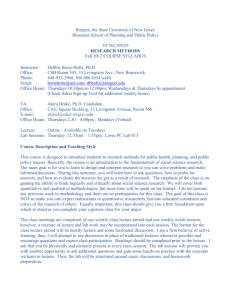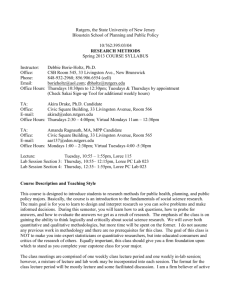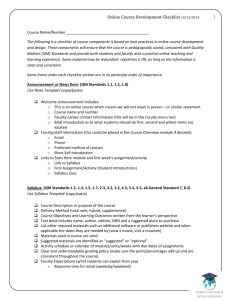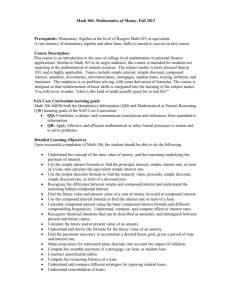Course Objectives - Bloustein School of Planning and Public Policy
advertisement
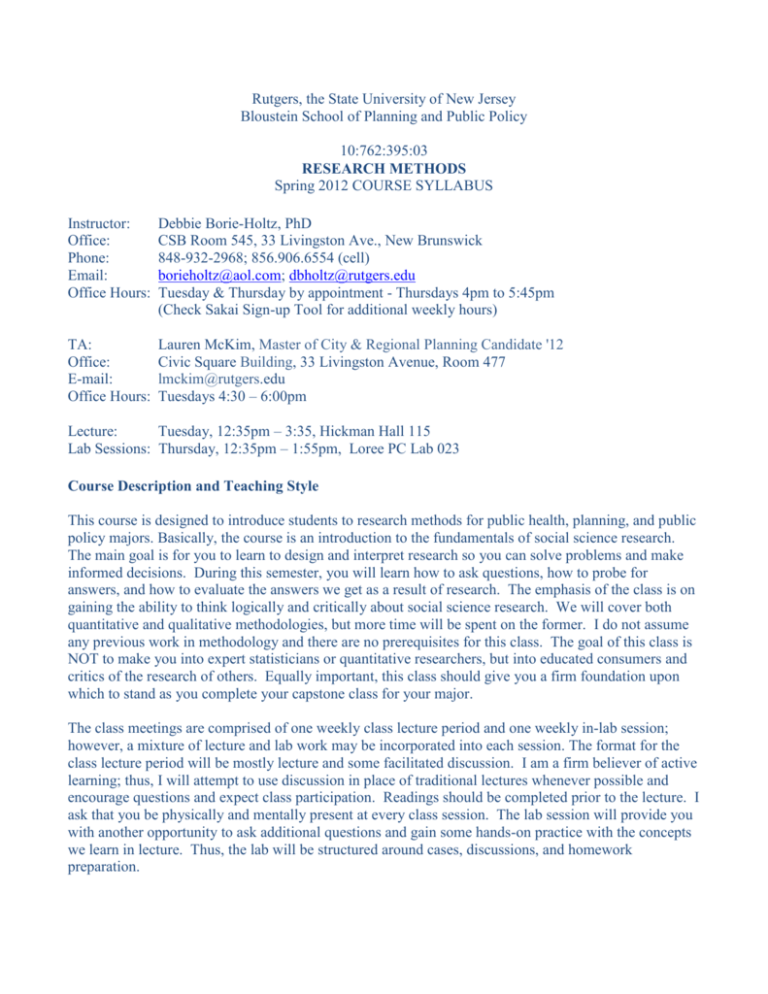
Rutgers, the State University of New Jersey Bloustein School of Planning and Public Policy 10:762:395:03 RESEARCH METHODS Spring 2012 COURSE SYLLABUS Instructor: Office: Phone: Email: Office Hours: Debbie Borie-Holtz, PhD CSB Room 545, 33 Livingston Ave., New Brunswick 848-932-2968; 856.906.6554 (cell) borieholtz@aol.com; dbholtz@rutgers.edu Tuesday & Thursday by appointment - Thursdays 4pm to 5:45pm (Check Sakai Sign-up Tool for additional weekly hours) TA: Office: E-mail: Office Hours: Lauren McKim, Master of City & Regional Planning Candidate '12 Civic Square Building, 33 Livingston Avenue, Room 477 lmckim@rutgers.edu Tuesdays 4:30 – 6:00pm Lecture: Tuesday, 12:35pm – 3:35, Hickman Hall 115 Lab Sessions: Thursday, 12:35pm – 1:55pm, Loree PC Lab 023 Course Description and Teaching Style This course is designed to introduce students to research methods for public health, planning, and public policy majors. Basically, the course is an introduction to the fundamentals of social science research. The main goal is for you to learn to design and interpret research so you can solve problems and make informed decisions. During this semester, you will learn how to ask questions, how to probe for answers, and how to evaluate the answers we get as a result of research. The emphasis of the class is on gaining the ability to think logically and critically about social science research. We will cover both quantitative and qualitative methodologies, but more time will be spent on the former. I do not assume any previous work in methodology and there are no prerequisites for this class. The goal of this class is NOT to make you into expert statisticians or quantitative researchers, but into educated consumers and critics of the research of others. Equally important, this class should give you a firm foundation upon which to stand as you complete your capstone class for your major. The class meetings are comprised of one weekly class lecture period and one weekly in-lab session; however, a mixture of lecture and lab work may be incorporated into each session. The format for the class lecture period will be mostly lecture and some facilitated discussion. I am a firm believer of active learning; thus, I will attempt to use discussion in place of traditional lectures whenever possible and encourage questions and expect class participation. Readings should be completed prior to the lecture. I ask that you be physically and mentally present at every class session. The lab session will provide you with another opportunity to ask additional questions and gain some hands-on practice with the concepts we learn in lecture. Thus, the lab will be structured around cases, discussions, and homework preparation. 762:395 Syllabus Page 2 of 6 Our teaching assistant for this semester will be Lauren McKim. Lauren will hold weekly office hours at Bloustein. Lauren will also be responsible for grading the lab assignments and midterm so if you have a question regarding grading, please forward an email to her directly as your initial course of action. Feel free to contact either of us with questions, but I ask that you only direct your queries to one of us. We will be sure to share our feedback with each other. Course Objectives The goal of this course is to provide students with 1) An understanding of the logic of scientific inquiry and how to measure concepts 2) An ability to develop a research hypothesis and a complementary research design 3) An awareness of different types of data collection and analyses – both qualitative and quantitative 4) An introduction to analyzing quantitative data to test your own ideas about relationships between concepts Required Text Schutt, Russell. 2009. Investigating the Social World: The Process and Practice of Research. 6th Edition. Available at the main Rutgers bookstore, in downtown New Brunswick and NJ Books on Easton Avenue. Supplemental readings will be distributed in class or posted to the class website on Sakai. Grading The totality of your grade is 100 percent. The components and weights are: 25 percent on midterm exam -- This will be a take-home exam in lieu of a lecture class. 40 percent on your lab assignments (10 points each) -- Assignment 1 - Define an indice -- Assignment 2 - Survey design and question wording critique -- Assignment 3 - Hypotheses & analysis plan -- Assignment 4 – Interpret and analyze a cross tab 10 percent on quizzes -- Quizzes will be equally weighted; expect 4-5 quizzes -- Quizzes are generally scheduled to ensure readings are completed timely. 25 percent on the final exam -- This will be a research analysis paper. Last edited 9/15/12 762:395 Syllabus Page 3 of 6 Letter grades will be assigned as follows: A = 90 - 100; Excellent or Superior B+ = 86 - 89; Very Good B = 80 - 85; Good C+ = 76 - 79; Solid Overall, but some flaws C = 70 - 75; Average D = 60 - 69; Significant problems in the work in terms of understanding, effort or writing F = 59 or below; Failing Expectations Collegial and respectful conduct is expected in class. Class members should consider themselves colleagues who will collaborate to help each other develop a solid understanding of materials and concepts. To facilitate this process and your learning, we will adhere to some basic rules: Attendance at all classes is expected. If you expect to miss a class, please use the University absence reporting website (https://sims.rutgers.edu/ssra /) to indicate the date and reason for your absence. An email is automatically sent to me. A link appears on our Sakai home page. My policy for missed classes is you will be granted two absences during the course of the semester IF you report them via the University website. This policy applies to both lectures and labs. Absences that exceed two will result in a cumulative grade deduction of 1 point per class, unless an emergency warrants an exception. Exceptions will be determined by me in accordance with department policy at the time of the request. Class will start and end on time. Although I understand emergencies occur, timely arrivals and departures should be the norm. Regular and frequent lateness will be treated as an absence. Please turn off your cell phones and other electronic devices during class. You may only use a laptop if you are taking notes for this class. All assignments must be completed on time. Assignments are due in hard copy AND as an electronic submission on Sakai as designated. The Sakai version will be used to time-stamp your submission. All assignments should be typed in 12-point font and submitted in hard copy. Late work will be penalized. One letter grade per week will be deducted from the final grade for lateness. Assignments will not be accepted any later than two class periods after the due date; missed assignments will receive a “0”. Quizzes may be made up before the next class attendance ONLY if you make prior arrangements and you have not exceeded the two unexcused absences. Late submissions for the take-home midterm and the final paper are not permitted. Both of these assessments are given over a multiple-day period so there is an expectation that students are working on the exams prior to the final submission day. If an unanticipated emergency occurs and a student is unable to complete the exam, you will be asked to submit all work completed on your exam (from the date of distribution through the date of the emergency) to determine if an exception is warranted. Last edited 9/15/12 762:395 Syllabus Page 4 of 6 Cheating, plagiarism and other forms of academic dishonesty will not be tolerated. Please see the University’s Policy on Academic Integrity for Undergraduate and Graduate Students located on the web at http://ctaar.rutgers.edu/integrity/policy.html. If any questions or concerns arise, please come see me during office hours or please make an appointment. If you desire a more immediate response, please send me an email or text. I can also schedule time to meet you virtually via Adobe Connect if you are unable to attend my campus office hours. If you plan to come to my on-campus office hours, please try to let me know in advance so that I can try to coordinate any student requests that I have received for the week. You can reserve office time through Sakai. Any student in this course who has a disability that may prevent him or her from fully demonstrating his or her abilities should contact me as soon as possible so we can discuss accommodations necessary to ensure full participation and to facilitate your educational opportunities. Exam and Assignment Schedule Assignment Assignment 1 Take-home Midterm Assignment 2 Assignment 3 Assignment 4 Final Paper Exam Last edited 9/15/12 Distribution Date January 26th March 8th March 29th April 3rd April 3rd April 3rd Due Date February 9th March 20th April 5th April 12th April 19th April 27th at Noon 762:395 Syllabus Page 5 of 6 Lecture and Reading Schedule Week Lecture Dates: Tuesday 1 1/17 Lecture Topic Introductions and course overview Lab Dates: Thursdays 1/19 Lab Exercises 2 1/24 Introduction to Qualitative & Quantitative Research; 1/26 3 1/31 Conceptualization and measurement 2/2 4 2/7 Research design and causation 2/9 5 2/14 Experiments 2/16 6 2/21 Non-Probability Sampling & Qualitative Methods: Part 1 (Interviews) 2/23 Qualitative Methods: Part 2 (Focus Groups & Other Methods) 3/1 7 2/28 Last edited 9/15/12 "Finding Information” Slides Define a Good Problem Statement Research Ethics Module "Define an Indices” Slides Distribute Assgn.1 (Due 2.9) Tweet: From concept to measurement Quiz 1: Ch 1, 2, 3 Critique a Research Design Assgn.1 Due Case Study: A Rush to Judgment Quiz 2: Ch 4, 6 Prepping for a Depth Interview Quiz 3: Ch 7 Recruit a Focus Group Readings Due (complete prior to lecture) Distribute syllabus; review course layout; Chapters 1 & 2 Chapters 3 Chapter 4 Chapter 6 Chapter 7 Chapter 5: 156-7; 169177 Chapter 9: 313-321; 338-344; Sakai Rdgs. Chapter 9: 321-338; 345-353; Chapter 10 (p. 371-384 only); Sakai Rdgs. 762:395 Syllabus 8 3/6 Page 6 of 6 Probability Sampling 3/8 M & M Sampling Exercise Quiz 4: NonProbability Sampling (Ch.5 partial) & Qualitative Methods (Ch. 9 & partial 10) Chapter 5, remaining pages Spring Break!!! 9 3/20 10 3/27 Take-Home Exam No Class Survey Research: Designing Surveys 3/22 3/29 11 4/3 12 4/10 13 4/17 14 4/24 Last edited 9/15/12 Survey Research: Designing & Fielding Surveys; Begin Univariate Analysis Distribute Final Assignments SPSS Workshop; Review Assignments &Work on Analysis Plans Assgn.2 Due Interpreting & Analyzing Cross Tabs; SPSS Drills Evaluative Research & Wrap-up Lecture; Individual Meetings 4/5 Review Policy Surveys in the Media Practice Question Wording Problems Distribute Assgn. 2: Critique a Questionnaire; Due 4.5 Univariate & Bivariate Analysis & Introduction to SPSS Review Final Assignments 4/12 Practice SPSS Assgn.3 Due 4/19 Assgn.4 Due 4/26 SPSS Final Paper Workshop Chapter 14; Assign Final Paper (Including Assgn.3 & 4) Appendix F; Jing videos Final Exam Paper Due: 4/27 at Noon
